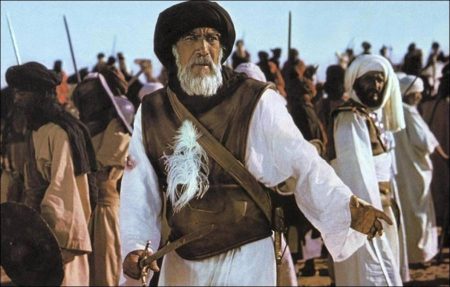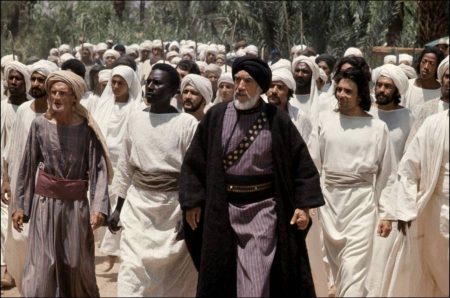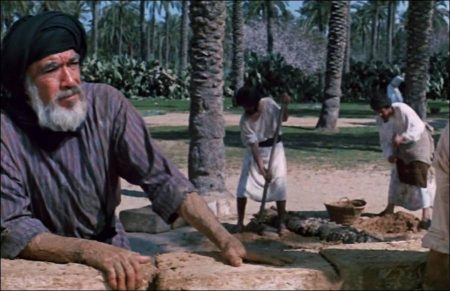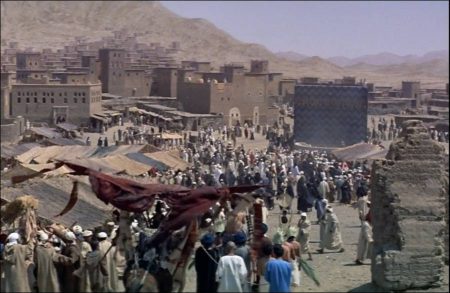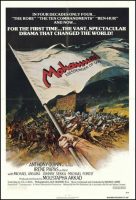Taglines: The story of Islam.
Mohammad, Messenger of God movie storyline. Handsomely-mounted historical epic concerns the birth of the Islamic faith and the story of the prophet Mohammed — who, in accordance with the tenants of Islam, is never to be depicted (as this is against certain Islamic schools of thought). In Mecca in the 7th century, Mohammed is visited by a vision of the Angel Gabriel, who urges him to lead the people of Mecca to cast aside the 300 idols of Kaaba and instead worship the one true God, speaking out against the corrupt political and military leaders who rule Mecca.
With the help of his uncle, a brave warrior named Hamza (Anthony Quinn), Mohammed and his followers return to Mecca to liberate the city in the name of God. The Message (originally screened in the U.S. as Mohammed, Messenger of God) proved to be highly controversial during its production and initial release. Unfounded rumors had it that Mohammed would not only be depicted in the film, but that he was to be played by Charlton Heston or Peter O’Toole. This resulted in protests by some Muslim, until director Moustapha Akkad hired a staff of respected Islamic clerics as technical advisors. The Message was shot in two versions, one in English and one in Arabic (entitled Al-Ris-Alah), with different actors taking over some of the roles due to language requirements.
The Message (Arabic: الرسالة Ar-Risālah; originally known as Mohammad, Messenger of God) is a 1976 Islamic epic drama film directed and produced by Moustapha Akkad, chronicling the life and times of the Islamic prophet Muhammad through the perspective of his uncle Hamza ibn Abdul-Muttalib and adopted son Zayd ibn Harithah.
Released in both separately-filmed Arabic and English-language versions, The Message serves as an introduction to early Islamic history. The international ensemble cast includes Anthony Quinn, Irene Papas, Michael Ansara, Johnny Sekka, Michael Forest, André Morell, Garrick Hagon, Damien Thomas, and Martin Benson. It was an international co-production between Libya, Morocco, Lebanon, Syria, Saudi Arabia, and the United Kingdom. The film was nominated for Best Original Score in the 50th Academy Awards, composed by Maurice Jarre, but lost the award to Star Wars (composed by John Williams).
About the Story
The film begins with Muhammad sending an invitation to accept Islam to surrounding rulers: Heraclius, the Byzantine Emperor; the Patriarch of Alexandria; the Sasanian Emperor. Earlier Muhammad is visited by the angel Gabriel, which shocks him deeply. The angel asks him to start and spread Islam. Gradually, almost the entire city of Mecca begins to convert. As a result, more enemies will come and hunt Muhammad and his companions from Mecca and confiscate their possessions. Some of these followers fled to Abyssinia to seek refuge with the protection given by the king there.
They head north, where they receive a warm welcome in the city of Medina and build the first Islamic mosque. They are told that their possessions are being sold in Mecca on the market. Muhammad chooses peace for a moment, but still gets permission to attack. They are attacked but win the Battle of Badr. The Meccans want revenge and beat back with three thousand men in the Battle of Uhud, killing Hamza. The Muslims run after the Meccans and leave the camp unprotected. Because of this, they are surprised by riders from behind, so they lose the battle. The Meccans and the Muslims close a 10-year truce.
A few years later, Khalid ibn Walid, a Meccan general who has killed many Muslims, converts to Islam. Meanwhile, Muslim camps in the desert are attacked in the night. The Muslims believe that the Meccans are responsible. Abu Sufyan comes to Medina fearing retribution and claiming that it was not the Meccans, but robbers who had broken the truce. None of the Muslims give him an audience, claiming he “observes no treaty and keeps no pledge.” The Muslims respond with an attack on Mecca with very many troops and “men from every tribe”.
Abu Sufyan seeks an audience with Muhammad on the eve of the attack. The Meccans become very scared but are reassured that no one will be abused in their houses, by the Kaaba, or in Abu Sufyan’s house will be safe. They surrender and Mecca falls into the hands of the Muslims. The pagan images of the gods in the Kaaba are destroyed, and the very first azan in Mecca is called on the Kaaba by Bilaal Ibn Rabaah. The Farewell Sermon is also delivered.
Mohammad, Messenger of God (1977)
Directed by: Moustapha Akkad
Starring: Anthony Quinn, Irene Papas, Michael Ansara, Johnny Sekka, Michael Forest, André Morell, Damien Thomas, Rosalie Crutchley, Neville Jason, Bruno Barnabe, John Bennett, Donald Burton
Screenplay by: H.A.L. Craig
Production Design by: Maurice Fowler, Tambi Larsen
Cinematography by: Said Baker, Jack Hildyard, Ibrahim Salem
Film Editing by: John Bloom
Costume Design by: Phyllis Dalton
Art Direction by: Norman Dorme, Abdel Monem Shokry
Music by: Maurice Jarre
MPAA Rating: None.
Distributed by: Tarik Film Distributors
Release Date: July 29, 1976 (London), March 9, 1977 (New York)
Views: 247
